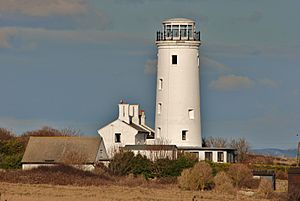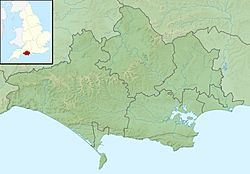Old Lower Lighthouse facts for kids
 |
|
| The Old Lower Lighthouse in 2009 | |
|
|
|
| Location | Isle of Portland Dorset England |
|---|---|
| Coordinates | 50°31′11″N 2°27′04″W / 50.519687°N 2.451061°W |
| Year first constructed | 1716 (first) 1759 (second) |
| Year first lit | 1869 (current) |
| Deactivated | 1906 |
| Construction | stone tower |
| Tower shape | cylindrical tower with balcony and lantern attached to a 2-storey building |
| Markings / pattern | white tower and lantern |
| Height | 25 metres (82 ft) |
| Original lens | 1st-order catadioptric fixed |
| ARLHS number | ENG-109 |
The Old Lower Lighthouse is an old lighthouse on the Isle of Portland in Dorset, England. It sits on the eastern side of Portland Bill. This lighthouse, along with its walls and a nearby house, was recognized as a special historical building in 1978.
This lighthouse worked with the Old Higher Lighthouse starting in 1716. It has been rebuilt twice since then. The first rebuild was in 1789, and it was the first lighthouse to use special lenses to make its light brighter. It was rebuilt again in 1869. The lighthouse you see today was built in 1869. Since 1961, it has been home to the Portland Bird Observatory.
Contents
History of the Old Lower Lighthouse
Why Lighthouses Were Needed at Portland Bill
The coast around Portland, especially Portland Bill and Chesil Beach, was very dangerous for ships. Many vessels crashed there over hundreds of years. Local people asked for lighthouses to be built to help guide ships safely.
In 1716, the organization called Trinity House agreed to build a lighthouse at Portland Bill. King George I gave permission for this project. That same year, two round stone lighthouses were built on Portland. They were about two-thirds of a mile from Portland Bill.
The First Lighthouses and Their Purpose
One lighthouse, the Old Higher Lighthouse, was built on a hill. The other, the Old Lower Lighthouse, was built on lower ground. These lighthouses were designed as "leading lights." This meant they worked together to guide ships. They helped ships navigate safely between the strong currents of Portland Race and the hidden sandbank called the Shambles.
The lights shone for the first time on September 29, 1716. At first, both lighthouses used fires to create their light. Trinity House took over managing the lights in 1752 because they found they were not being kept up very well.
Improvements and Rebuilds Over Time
In 1789, Trinity House hired a builder named William Johns to tear down and rebuild the lower lighthouse. The new lighthouse was 63 feet tall and made of Portland stone. It was fitted with six special lamps and mirrors. It also had a new lens system created by Thomas Rogers.
Rogers was experimenting with putting lenses into lighthouse lanterns. This was the first time his lenses were used in a real lighthouse. Even though they were only used for a few years, this was the start of something important. Using lenses in lighthouses later became a common practice.
In 1824, the lights in both the High and Lower lighthouses were updated and made better. The High Light was made to revolve, meaning its light spun around. The Lower Light stayed still, but its power and brightness were greatly increased.
In 1869, Trinity House rebuilt both lighthouses again to make even more improvements. At this time, each lighthouse received a large, fixed lens system. These were designed and built by James Timmins Chance.
A New Lighthouse and New Uses
Around the year 1900, Trinity House planned to build a brand new lighthouse at Bill Point. This new lighthouse would replace both the Old Lower and Old Higher lighthouses. The new lighthouse was finished in 1905. After it was built, the two original lighthouses were sold off.
During World War I, the Old Lower Lighthouse was used as a tea garden. After that, it changed owners several times and was even a family home for a while. After World War II, the lighthouse was empty and falling apart.
The Lighthouse Becomes a Bird Observatory
Studying Birds on Portland
In the 1950s, studying how birds migrate (travel long distances) became popular on Portland. Many bird experts, called ornithologists, visited the island and Portland Bill. They were very interested in the birds there.
Thanks to a kind donation from Miss Helen Brotherton and her family, the bird experts were able to make the lighthouse their permanent home. In March 1961, all the repair work was finished. The observatory was officially opened by Sir Peter Scott, a famous bird expert. It was named Portland's Bird Observatory and Field Centre.
What the Observatory Does Today
The observatory later became a registered charity. This means it's a non-profit organization that helps people. It welcomes all naturalists, not just bird watchers. It also offers simple, hostel-style rooms for people to stay in while they study nature.
 | George Robert Carruthers |
 | Patricia Bath |
 | Jan Ernst Matzeliger |
 | Alexander Miles |


